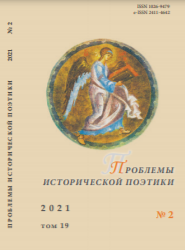«Чудесный уголок земли»: Ла Фавьер как locus amoenus в литературе русского зарубежья
“A Wonderful Corner of the Earth”. La Favière as Locus Amoenus in the Literature of the Russian Emigration
Author(s): Jolanta BrzykcySubject(s): Studies of Literature, Russian Literature, Interwar Period (1920 - 1939), Migration Studies
Published by: Петрозаводский государственный университет
Keywords: literature of the “first wave” of Russian emigration;literature of the Russian abroad;La Favière;Sasha Cherny;Alexander Kuprin;Marina Tsvetaeva;local text in Russian literature;idyll;locus amoenus;
Summary/Abstract: The article is dedicated to representations of the southern French village of La Favière in the literature of the first wave of Russian emigration. It aims to examine the representations of a colony founded on the Côte d’Azur by Russian refugees, scholars, writers and artists, which existed until the outbreak of World War II. The objects of study include Favière-inspired poetry by Sasha Chernyi, published in the Poslednie novosti journal between 1927 and 1932, Aleksandr Kuprin’s series of essays entitled Huron Headland (1929), and Marina Tsvetaeva’s poems written in the summer of 1935. Emphasis is also placed on the epistolography and memoirs of Russian emigrants visiting the “Russian village”: letters by Georgi Griebenshchikov, memoirs by Ludmila Wrangel, Ksenia Kuprina, and Galina Rodionova. The La Favière phenomenon in the works of Russian emigrants has not been discussed before, which is what makes this article timely. The analysis of the above-mentioned works covers primarily their subject matter, but their connections with composition, stylistics and the question of genre affiliation are also discussed. Research demonstrates that despite the different ways in which the countryside is portrayed (its idealization in the poetry of Chernyi, comparison with Crimea - a true but lost paradise in Kuprin’s prose, rejection of Provence in Tsvetaeva’s poems), the tendency in Russian expatriate literature to interpret La Favière as locus amoenus persisted. In the works of Russian emigrants, the countryside evokes positive connotations, enchants with its landscape and tranquility, the naturalness of life replete with manual labor and close contact with nature. As a result, in the system of local texts of Russian emigration, bound together by the motif of foreignness as locus horribilis, La Favière holds a unique place, representing a rare example of Arcadia found in exile.
Journal: Проблемы исторической поэтики
- Issue Year: 19/2021
- Issue No: 2
- Page Range: 251-281
- Page Count: 31
- Language: Russian

